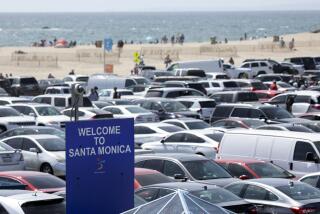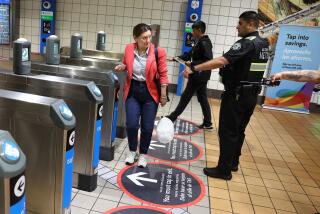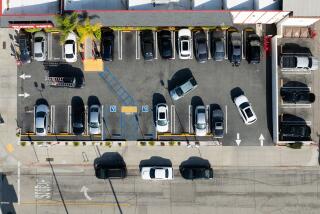A changeless love affair with parking meters runs for 48 years
John Delianedis first encountered a parking meter nearly half a century ago. It was love at the drop of the first nickel.
“I was amazed by it,” said Delianedis, 65, of Monterey Park. “I was still in high school (in his native Watertown, Mass.). It was 1938, and I’d gone down to Paterson, N.J., with a cousin who was looking for a job there. We drove around looking for a parking place, and, boom, there this thing was.
“Would you believe two hours for a nickel back in those days?”
Forty-eight years and millions of dollars of nickels--and dimes and quarters--later, Delianedis’ romance with parking meters continues.
His fascination with the meters recently paid a dividend of sorts: a diamond-studded service pin and certificate honoring him for 40 years of “dedication and performance” from the city of Los Angeles’ transportation commissioners.
From collector of parking meter fees, Delianedis rose to manager of the city’s parking meter program.
“When I came aboard, parking meters were a new thing in this city. I’ve grown up with them in this job,” he said.
He was honored at a ceremony in his Piper Technical Center headquarters, with two of his four younger brothers--both also longtime city employees--looking on. They are Alex, a fireman for 30 years, and George, now principal investigator for the Social Services Department and a municipal employee for 25 years.
City Hall veterans said they know of no other family that can match the lengthy municipal service record of John Delianedis and his two brothers.
Between them, the three Delianedises have put in 95 years working for the City of Los Angeles. And the brothers have every intention of sticking around until the family reaches the century mark.
“I don’t feel like retiring,” said John Delianedis. “I like what I’m doing.”
Delianedis arrived in a parking-meterless Los Angeles in 1942. A mechanic with the Air Force’s 27th Fighter Squadron, he was stationed in Inglewood at a base known then as Mines Field.
After the war, he led the migration of the Delianedis family to Southern California from Massachusetts where his father, a Greek immigrant, was a tailor.
The family had come to Los Angeles to visit him, Delianedis said.
“They liked what they saw so much and wanted to get away from the snow and the cold back East, so they moved out too,” he recalled.
Delianedis got his first job with the city in March, 1946, when he went to work as a civilian clerk in the records bureau of the Police Department. About that time, Los Angeles was getting its first parking meters. The devices originated in Oklahoma City in 1935, Delianedis said.
Five years later there was an opening for a meter collector for the city clerk’s office, which, at the time, handled the chore. Soon, because of his background as a mechanic, Delianedis became repairman, then a senior repairman and after that a supervisor.
His brothers soon followed him and joined the city’s work force.
Delianedis was promoted to his present job as head of the parking meter program about three years ago. He is now in charge of collections from and repair of the city’s more than 31,000 meters, as well as planning where new ones should be added and old ones removed.
When Delianedis began as a collector, Los Angeles had a mere 1,000 meters. Now, the city adds as many as 3,000 each year.
But some things have not changed much. Meters in some areas of the city still cost motorists as little as 10 cents an hour, though an increase to 20 cents is probably on the horizon, Delianedis said.
In contrast, meters in the civic center and the downtown business district are the costliest. Motorists must plunk in a dollar for an hour’s time.
“But they’re still a big bargain,” said Delianedis, the parking meter’s biggest booster. “We took a survey and found parking lots there charge as high as $3 an hour.
“And (meters) make enforcement a lot easier. Without them, enforcers have to chalk a car’s tires every hour and then come back and check on the car. Meters do the job of spotting violations for them.”
More to Read
Sign up for Essential California
The most important California stories and recommendations in your inbox every morning.
You may occasionally receive promotional content from the Los Angeles Times.










